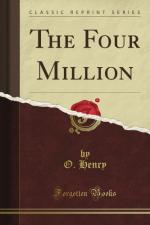The gong whirred, and the Glaring-at-Gotham car moved majestically upon its instructive tour.
On the highest, rear seat was James Williams, of Cloverdale, Missouri, and his Bride.
Capitalise it, friend typo—that last word—word of words in the epiphany of life and love. The scent of the flowers, the booty of the bee, the primal drip of spring waters, the overture of the lark, the twist of lemon peel on the cocktail of creation—such is the bride. Holy is the wife; revered the mother; galliptious is the summer girl—but the bride is the certified check among the wedding presents that the gods send in when man is married to mortality.
The car glided up the Golden Way. On the bridge of the great cruiser the captain stood, trumpeting the sights of the big city to his passengers. Wide-mouthed and open-eared, they heard the sights of the metropolis thundered forth to their eyes. Confused, delirious with excitement and provincial longings, they tried to make ocular responses to the megaphonic ritual. In the solemn spires of spreading cathedrals they saw the home of the Vanderbilts; in the busy bulk of the Grand Central depot they viewed, wonderingly, the frugal cot of Russell Sage. Bidden to observe the highlands of the Hudson, they gaped, unsuspecting, at the upturned mountains of a new-laid sewer. To many the elevated railroad was the Rialto, on the stations of which uniformed men sat and made chop suey of your tickets. And to this day in the outlying districts many have it that Chuck Connors, with his hand on his heart, leads reform; and that but for the noble municipal efforts of one Parkhurst, a district attorney, the notorious “Bishop” Potter gang would have destroyed law and order from the Bowery to the Harlem River.
But I beg you to observe Mrs. James Williams—Hattie Chalmers that was—once the belle of Cloverdale. Pale-blue is the bride’s, if she will; and this colour she had honoured. Willingly had the moss rosebud loaned to her cheeks of its pink—and as for the violet!—her eyes will do very well as they are, thank you. A useless strip of white chaf—oh, no, he was guiding the auto car—of white chiffon—or perhaps it was grenadine or tulle—was tied beneath her chin, pretending to hold her bonnet in place. But you know as well as I do that the hatpins did the work.
And on Mrs. James Williams’s face was recorded a little library of the world’s best thoughts in three volumes. Volume No. 1 contained the belief that James Williams was about the right sort of thing. Volume No. 2 was an essay on the world, declaring it to be a very excellent place. Volume No. 3 disclosed the belief that in occupying the highest seat in a Rubberneck auto they were travelling the pace that passes all understanding.
James Williams, you would have guessed, was about twenty-four. It will gratify you to know that your estimate was so accurate. He was exactly twenty-three years, eleven months and twenty-nine days old. He was well built, active, strong-jawed, good-natured and rising. He was on his wedding trip.




